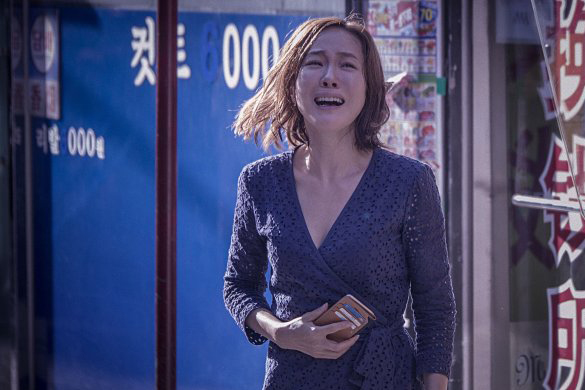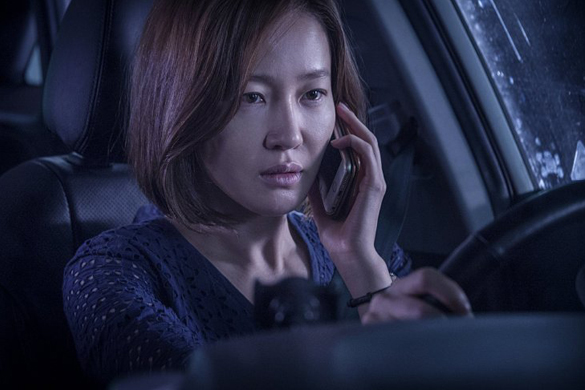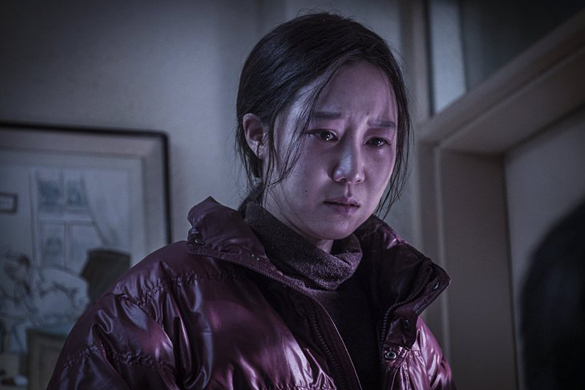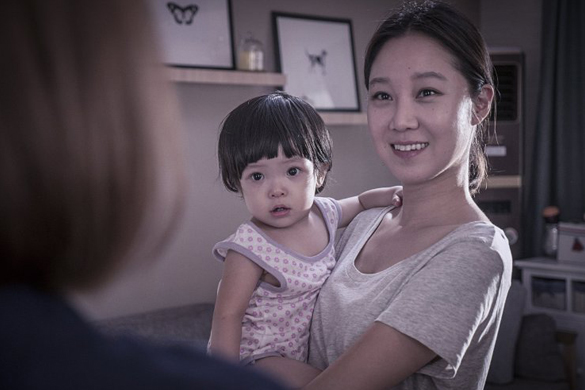"You'll always see and hear pretty things, I'll make sure of it.
You'll be the happiest baby in the world. I'll make that happen. I love you, my child..."
Synopsis:
Embroiled in an ongoing custody battle for her young daughter, Ji-sun (Uhm Ji-won) is struggling to hold her life together, keep her head above water and balance the needs of her child, Da-eun, with the endless demands of her job in the PR industry. So much so that as often as not she finds herself rushing desperately to meet press release deadlines with little option but to leave Da-eun under the care of her Chinese nanny, Han-mae (Gong Hyo-jin).
At the end of yet another deeply stressful day, Ji-sun returns home to find her apartment empty, with Da-eun and Han-mae nowhere to be found, and as hour after hour passes – Ji-sun unable even to contact Han-mae by phone – she comes to the shocking realisation that her nanny has abducted her daughter.
However, as Ji-sun’s frantic search for Da-eun begins, leading her into the dark underbelly of Korean society, she is soon to discover that good and evil, victim and villain, are concepts that are rarely wholly black and white...
Review:
The first few scenes of ‘Missing’ serve as an overview of Ji-sun’s working and personal life. We repeatedly hear her apologising to her boss on the phone for the lateness of deadline work, see her almost ignore Da-eun while rushing to complete a press release – calling on Han-mae to come and take the child into another room – and even watch her falling asleep on a couch when she’s meant to be watching a television programme to provide PR coverage for it, and that’s before we even consider the constant stress she’s under as a result of the ongoing (losing) custody battle with her ex-husband for Da-eun.
From the very outset, director Lee Eon-hee uses brisk pacing within these many small, tightly packed scenes to deftly underline to an absolutely palpable level just how close Ji-sun is to the end of her tether and how increasingly difficult she’s finding it to even cope with everyday events and life as a working mother in general. In fact, Ji-sun’s inability to find any sort of a work/life balance is shown to have caused her to employ Han-mae as Da-eun’s nanny without adequately checking her credentials, which are subsequently easily proved to be fake. Ji-sun should, of course, never be blamed in any way for Han-mae’s abduction of Da-eun but this implication certainly gives pause for thought, standing as the first of many well crafted, thought-provoking levels present in 'Missing'.
It says a great deal about Lee Eon-hee’s talent as a director that by the time of Da-eun’s abduction – just ten minutes into the film – we already know Ji-sun’s personality in depth; see her as a fully fledged, three dimensional character; and follow her without question on her frantic journey to the darker side of Korean society to find her daughter, feeling her excrutiating pain every step of the way.
 |
As Ji-sun's search for Da-eun continues, the story of Han-mae's life is gradually revealed in flashback - starting with more recent events and subsequently stepping further back in time - and this is where 'Missing' really comes into its own and shows its strengths:
Within Han-mae's story, director Lee Eon-hee serves up a critique of numerous serious (and seriously dark) Korean societal issues - the financially focused healthcare system and how it can give preference to the 'haves' above the 'have-nots'; the difficulties faced by non-Korean nationals, both in terms of living legitimately in the country and indeed earning a living; the illegal, black market organ transplant industry; and the struggles of the poor on the very edge of society leaving some with little option but to put themselves in the hands of loan sharks or having to earn money under the radar, through prostitution and the like - and while each of these underbelly elements has been detailed in numerous Korean films over the years, 'Missing' weaves them together in an intricately gripping manner that ensures they feel not only believable but also wholly necessary to the story, rather than coming across as derivative.
Lee Eon-hee also further accents some of these ideas through seemingly passing scenes shown either from Ji-sun's perspective and later revealed to be pivotal to Han-mae's story (for example, a number of bags being stacked up on a hospital trolley; and an injury Da-eun suffered while under the care of a previous nanny) or depicted as trivial moments from Han-mae's past (eg: her embroidering of a piece of cloth) that become vital to the narrative's climax. Some of these that relate to both Ji-sun and Han-mae even take place before Ji-sun even knew who Han-mae was, underling the fact that the paths of the two women crossed without Ji-sun even being aware.
Not only that, but as Han-mae's story is gradually revealed Lee Eon-hee goes into perfect depth in showing what drove Han-mae to make her, some would say evil, choices and as such while there can ultimately be no justification for Han-mae's terrible actions against Ji-sun in the abduction of her daughter, 'Missing' deftly states that good and bad are rarely wholly black and white concepts.
 |
Just as the aforementioned societal issues have appeared on numerous occasions in Korean cinema, there is a absolute plethora of Korean films focusing on or featuring the abduction of children. Many of these - especially those helmed by women - are used in part to the emergence of female strength, either in the face of or as a result of adversity.
Lee Eon-hee (also female) takes a somewhat different tack in 'Missing', for while Han-mae changes (some might say she's ultimately weaker) as a result of what she's had to face, even though for a large part of the film she is resolute in her dubious choices, Ji-sun is largely the same person at the end of her character arc as she was at its beginning.
Instead, Lee Eon-hee deftly and poignantly uses 'Missing' to speak of motherhood and ultimately the bond between mother and child - a bond far stronger than any other that influences each and every decision a mother makes - shown from the perspective of each of the main female characters in the wake of Da-eun's abduction. To my mind, the film's literal (Korean) title of "Missing Woman" in a story of a child's abduction speaks volumes about the importance of such themes, to the nth degree.
‘Missing’ is deftly conceived and created, possessing an unquestionable strength throughout. However, the film’s most powerful moment by far comes in the penultimate scene. Director Lee Eon-hee uses a single decision and action by Ji-sun to subtly, quietly scream without dialogue that she wholly understands the pain Han-mae has suffered, in spite of the pain the nanny has caused by abducting her child. The response to Ji-sun’s action lasts only a matter of seconds, but as far as I’m concerned it is nonetheless one of the most heart-wrenchingly poignant moments to appear in Korean cinema in recent years. I realise I am being rather vague on the subject, but all of those watching ‘Missing’ deserve to be allowed to experience the emotional outpouring this deeply moving scene is guaranteed to bring and see a perfect underlining of the film’s each and every major theme, in the process.
Massive, massive credit must be given to director Lee Eon-hee and scriptwriter Hong Eun-mi for succeeding in eliciting viewer sympathy, and even empathy, for a character who is essentially the villain of the piece.
 |
Summary:
While the societal issues critiqued in 'Missing' - and indeed its child abduction story as a whole - can be found in a virtual plethora of Korean films, director Lee Eon-hee wholly succeeds in weaving them together into a worthy, grippingly intricate and ultimately deeply poignant tale of motherhood and female understanding of female pain.
MISSING [aka MISSING WOMAN] (미씽: 사라진여자) / 2016
Directed by Lee Eon-hee; starring Uhm Ji-won & Gong Hyo-jin
|





